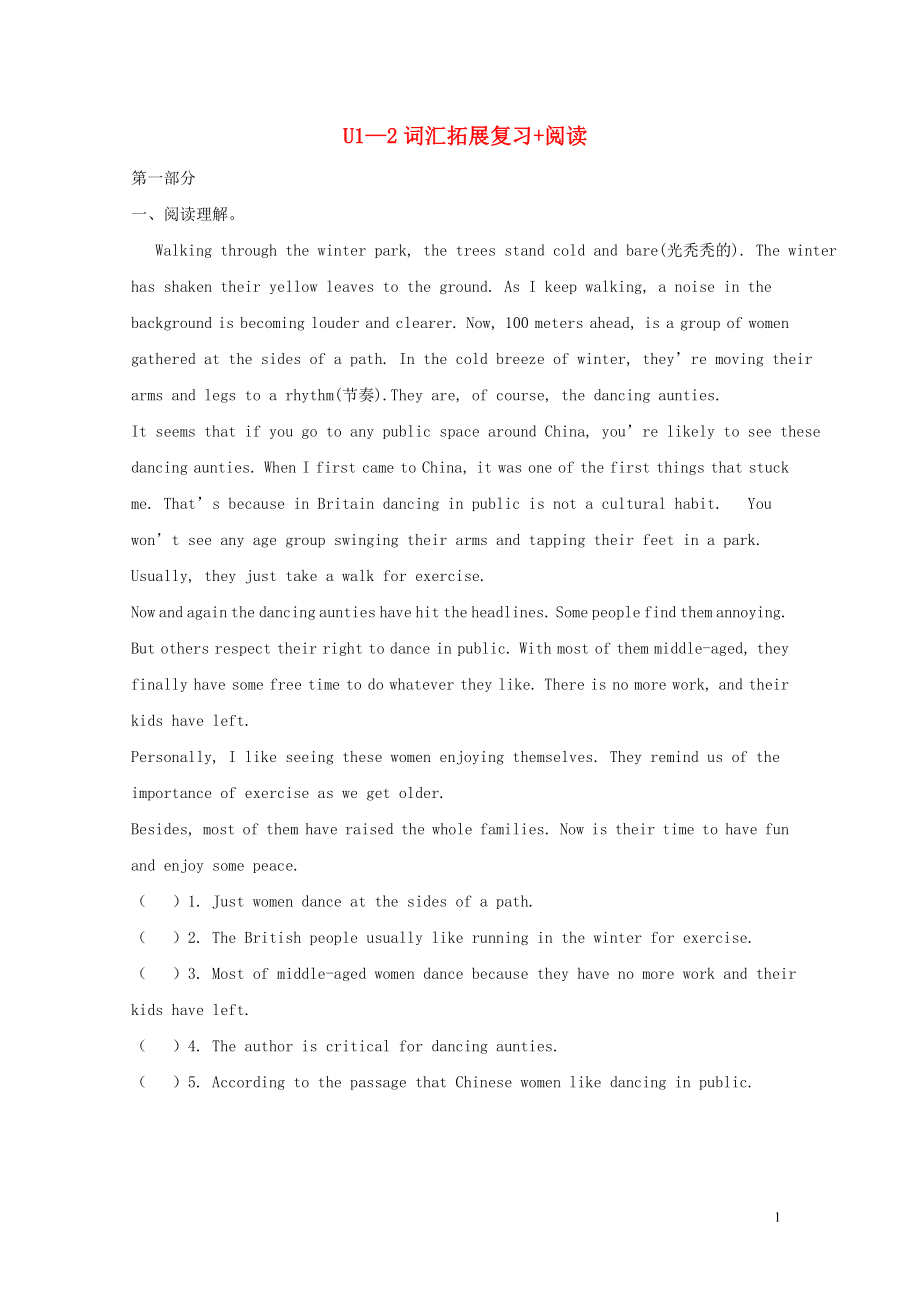《2019中考英語(yǔ) 八上 Unit 1-2詞匯拓展復(fù)習(xí)+閱讀 人教新目標(biāo)版》由會(huì)員分享���,可在線閱讀�,更多相關(guān)《2019中考英語(yǔ) 八上 Unit 1-2詞匯拓展復(fù)習(xí)+閱讀 人教新目標(biāo)版(5頁(yè)珍藏版)》請(qǐng)?jiān)谘b配圖網(wǎng)上搜索����。
1、 U1—2詞匯拓展復(fù)習(xí)+閱讀
第一部分
一�、閱讀理解。
Walking through the winter park, the trees stand cold and bare(光禿禿的). The winter has shaken their yellow leaves to the ground. As I keep walking, a noise in the background is becoming louder and clearer. Now, 100 meters ahead, is a group of women gathered at the sides
2�、of a path. In the cold breeze of winter, they’re moving their arms and legs to a rhythm(節(jié)奏).They are, of course, the dancing aunties.
It seems that if you go to any public space around China, you’re likely to see these dancing aunties. When I first came to China, it was one of the first things that
3、 stuck me. That’s because in Britain dancing in public is not a cultural habit.? You won’t see any age group swinging their arms and tapping their feet in a park. Usually, they just take a walk for exercise.
Now and again the dancing aunties have hit the headlines. Some people find them annoying. B
4���、ut others respect their right to dance in public. With most of them middle-aged, they finally have some free time to do whatever they like. There is no more work, and their kids have left.
Personally, I like seeing these women enjoying themselves. They remind us of the importance of exercise as we
5��、get older.
Besides, most of them have raised the whole families. Now is their time to have fun and enjoy some peace.
(? )1. Just women dance at the sides of a path.
(? )2. The British people usually like running in the winter for exercise.
(? )3. Most of middle-aged women dance because they have
6�����、 no more work and their kids have left.
(? )4. The author is critical for dancing aunties.
(? )5. According to the passage that Chinese women like dancing in public.
【主旨大意】本文是一篇說(shuō)明文�����。介紹了中國(guó)當(dāng)下非常流行的廣場(chǎng)舞���,中國(guó)的這種文化與英國(guó)是不同的。跳廣場(chǎng)舞的大多是中年婦女�����,她們?cè)跒檎麄€(gè)家庭做出巨大貢獻(xiàn)的同時(shí)����,也要學(xué)會(huì)享受生活,作者十分支持這一娛樂方式���。
【參考答案】1--5 BBABA
二���、短文改錯(cuò)。
此題要
7����、求改正所給短文中的錯(cuò)誤。對(duì)標(biāo)有題號(hào)的每一行做出判斷�����,每一行均有一處錯(cuò)誤。請(qǐng)按下列情況進(jìn)行改正�。此行多一個(gè)詞:把多余的詞用斜線(╲)劃掉,在該行右邊橫線上寫出該詞��,也并用斜線劃掉��。此行缺一個(gè)詞:在缺詞處加一個(gè)漏字符號(hào)(∧)��,在該行右邊橫線上寫出該加的詞����。此行錯(cuò)一個(gè)詞:在錯(cuò)的詞下面劃一橫線,在該行右邊橫線上寫出改正后的詞��。
At 3:42 am something began to shake. It seemed that??? 1. __________
the world was in an end! Eleven kilometers directly bel
8���、ow???????? 2. __________
the city, the greatest earthquake of the 20th century begin.??? ? 3. __________
It was heard in Beijing where is one hundred kilometers ?????????? 4. __________
away. One third of the nation felt. A huge crack that was ???????? 5. __________
eig
9��、ht kilometers long and thirty meters wide cut cross ??????????????? 6. __________
houses, roads and canals. Steam burst into from holes in the ?????????? 7. __________
ground. Hard hills of rocks become rivers of dirt. In ?????????????? 8. __________
fifteen seconds a large city la
10���、in in ruin(廢墟). Two thirds of ???????????9. __________
people died of or injured during the earthquake. ?????????????????????? 10. __________
參考答案
1. something改?everything 2.in改at??? 3. begin?改began??
4. where改which/that 5. felt后加?it???? 6.cross改across?
7.burst into去
11、掉???into??? 8. become改became?
9. lain改lay??? ?10.died of ?去掉??of?????
三�����、復(fù)習(xí)。(詞匯拓展)
(該部分單詞主要為動(dòng)詞���、名詞或形容詞等的變形,常在單項(xiàng)填空���、完形填空和短文填空題型中進(jìn)行考查�����,標(biāo)★單詞的變形尤其要重點(diǎn)掌握�����。)
1. few adj.很少的��;幾乎沒有的→____________(比較級(jí))較少的�����;更少的→____________(最高級(jí))最少的★
2. bore v.使煩擾→____________ adj.厭倦的�����;煩悶的→____________adj.沒趣的�����;令人厭倦的★
12��、
3. decide v.決定→____________n.決定★
4. build v.建造→____________ n.建筑物��;房子→____________(過去式/過去分詞)建筑����;建造
5. trade n.& v.貿(mào)易;交易→____________ n.商人
6. hunger v.餓�����;饑餓→____________adj.饑餓的
7. die v.消失�����;滅亡→____________(過去式/過去分詞)→____________(現(xiàn)在分詞)→____________n.死�����;死亡★
8. wonder v.想知道; n.奇跡→____________ adj.精彩的����;
13、絕妙的
參考答案:
1. fewer; fewest 2. bored; boring 3. decision 4. building; built
5. trader 6. hungry 7.died; dying; death 8. wonderful
第二部分
完形填空
閱讀下面短文����,掌握其大意,然后從各題所給的A����、B�����、C或者D四個(gè)選項(xiàng)中選出最佳選項(xiàng)��。
Few people like changing their habits, good or bad. Whether it is smoking, drinking or over-eating, they 1
14����、“enjoying” them to the end.
On every packet of cigarettes(香煙), people are warned against the 2 of smoking: “Warning: Cigarette Smoking Is Dangerous to Your Health”. 3 , millions of them start smoking or go on smoking. Why?
Facts show that families and surroundings(環(huán)境) play a very important
15、 part in 4 smokers. All those smokers come from smoking families or have smoking 5 or relatives. Films and TV plays also play a part. People 6 their “heroes” on TV drinking alcohol(酒) or smoking cigarettes. “Heroes” seem to fear 7 , neither killing themselves nor killing others with al
16����、cohol and cigarettes. If they are not afraid of the harm of smoking and drinking, 8 should common people be afraid?
The simple warning on the cigarette packet does not influence smokers’ habits. Even 9 warnings, like showing pictures of smokers who have died of cancer, don’t seem to work.
17、
Knowing and believing seem to be two 10 things. If smoking is really as harmful as doctors say, it is time for smokers to think about it and try to give it up!
1. A. stop B. continue C. finish D. avoid
2. A. chances B. excuses C. causes D. dangers
3. A. Moreover B.
18、Also C. However D. Otherwise
4. A. influencing B. explaining C. improving D. describing
5. A. parents B. uncles C. brothers D. friends
6. A. hear B. catch C. watch D. face
7. A. something B. nothing C. anything D. everything
8. A. what B. how C. when D. why
9. A. stronger B. worse C. longer D. harder
10. A. similar B. pleasant C. different D. boring
參考答案1—10����、BDCAD CBDAC
5
 2019中考英語(yǔ) 八上 Unit 1-2詞匯拓展復(fù)習(xí)+閱讀 人教新目標(biāo)版
2019中考英語(yǔ) 八上 Unit 1-2詞匯拓展復(fù)習(xí)+閱讀 人教新目標(biāo)版

